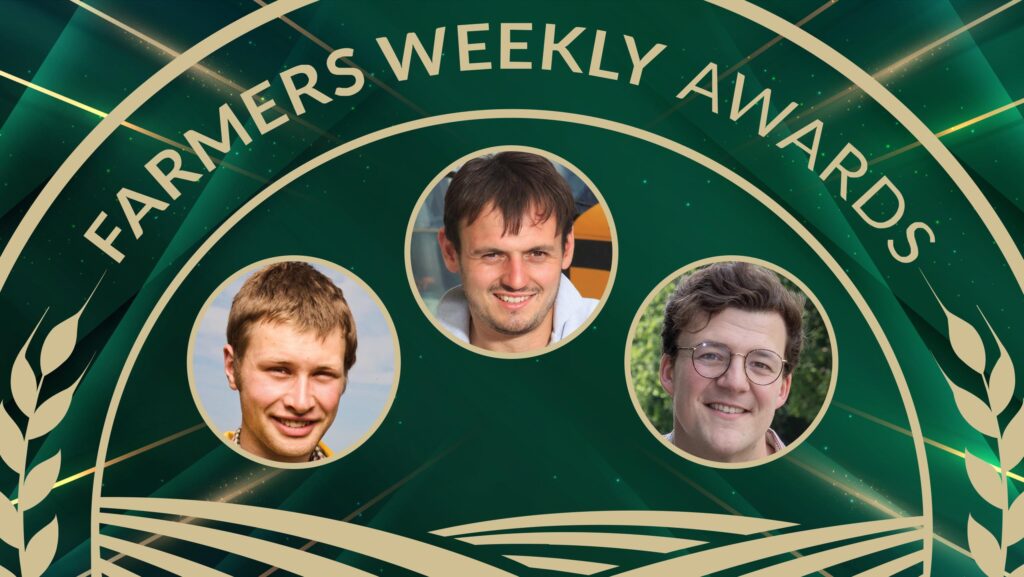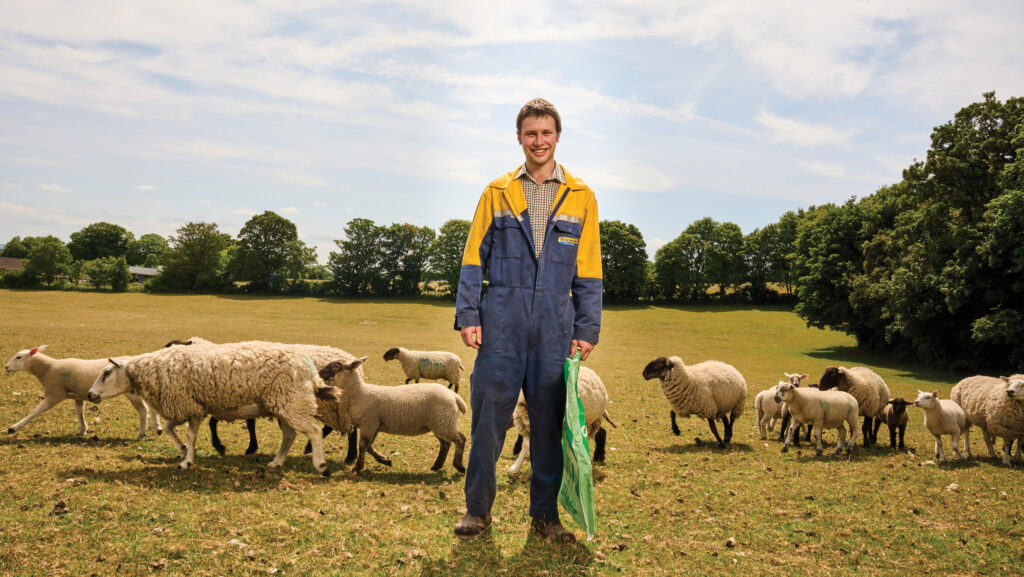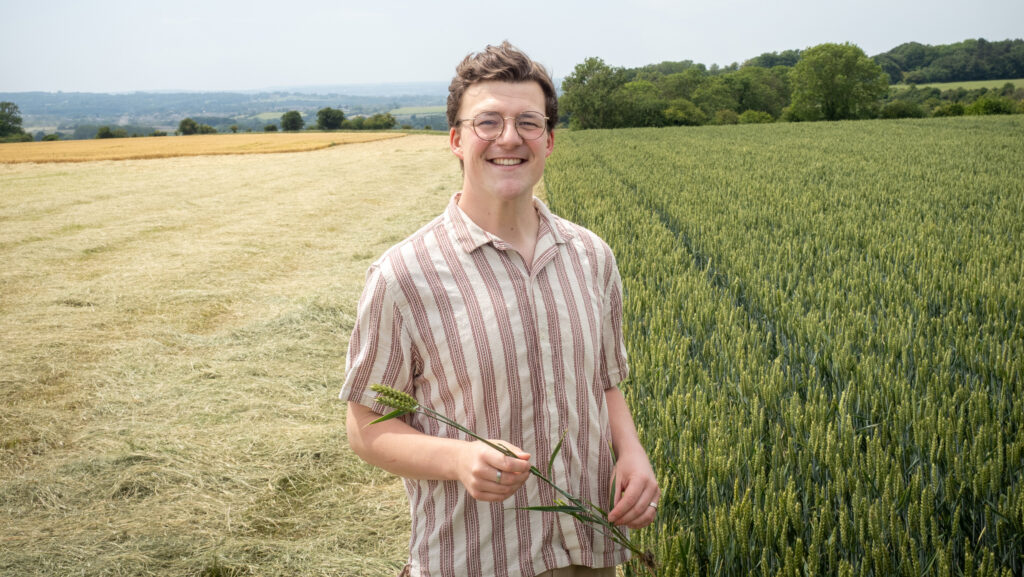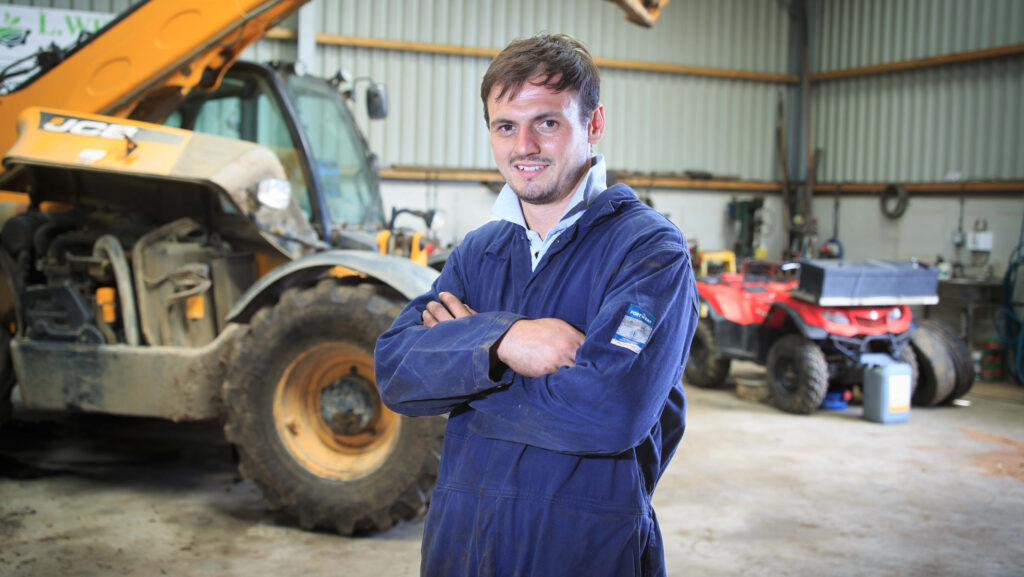FW Awards: Meet the 2025 Young Farmer of the Year finalists
 Matt Hancocks, Lewis Witcomb and Mike Wilkins © Oli Lees, Tim Scrivener, Kathy Horniblow
Matt Hancocks, Lewis Witcomb and Mike Wilkins © Oli Lees, Tim Scrivener, Kathy Horniblow This year’s outstanding Young Farmer of the Year Award finalists share a deep connection to farming, expert knowledge of their industry, and sharp business acumen, demonstrating dedication to their craft and to the future of agriculture.
Finalists
- Matt Hancocks, Stockbridge, Hampshire
- Mike Wilkins, Nolands Farm, Wiltshire
- Lewis Witcomb, Melton Mowbray, Leicestershire
The judges
-
Last year’s winner Ellie Lovell has played a central role in modernising operations and improving productivity on her family’s 800-cow dairy farm in Herefordshire.
-
Independent judge Charles Mason is chairman of agricultural adviser CXCS, which offers bespoke support on compliance, health and safety, assurance and subsidies.
-
Farmers Weekly reporter Albie Matthews has a background in investigations and current affairs and has worked for broadcast, international and local press.
See also: FW Awards: Meet the 2025 Ag Student of the Year finalists
Matt Hancocks, Stockbridge, Hampshire

Matt Hancocks © Oli Lees
At just 21, Matt Hancocks has turned a childhood passion into a thriving livestock business, M Hancocks Livestock, which is now valued at about £170,000.
With no family farm, no outside funding, and starting with just six chickens and a handful of store lambs, Matt has built his 40ha enterprise from the ground up on grit, reinvestment and an unwavering work ethic.
“It’s always been the case in my mind that if you want it, you can’t stand around waiting for help, you’ve just got to go and do it,” says Matt, who began his journey into farming in his early teens, buying and fattening 40 store lambs on tack grass.
“Once they were sold, I reinvested the money each year growing the number of store lambs I fattened. In the year 2024, I reached a total of 420 sheep which included my first breeding ewes along with stores. It felt like a great achievement.” he says.
Investment
He now manages 85 breeding ewes, more than 400 sheep, and an expanding beef store enterprise.
He owns all his machinery, including a new tractor, a straw chopper and mobile handling systems.
A graduate of agricultural college with distinction-level qualifications,
Matt balances day-to-day stock management with strategic growth.
He also works as a relief herdsman and contract shepherd in his local area, funding further investment into his business.
“I mainly want to focus on cattle going forward, but I’ll keep my 85 ewes to the ram,” he says. “I want to build the cattle numbers to 60 once I’ve got the facilities.”
One of Matt’s financial advantages has been his hands-on mechanical skills. He maintains and repairs his own machinery whenever he can to cut costs.
Innovation
He has also innovated in small but practical ways, including installing solar panels on his electric fence batteries to save energy and reduce time spent maintaining them.
In the past year, Matt has revamped his lambing system to reduce stress on both animals and the handler. “Happy sheep, happy handler,” he says.
He has also introduced a strict health protocol for incoming livestock, including worming and mineral supplementation based on veterinary advice and research.
“I used to worm them all with Combinex but recently switched to Cydectin, and I follow that with Liquiflow to restore mineral levels,” he explains. “It has worked a treat; last year they finished a month earlier after the change.”
Matt believes that well-managed livestock are more productive and, therefore, more profitable.
“If they’re not stressed, they perform better,” he says, noting the positive impact these small management changes have had on finishing times and market value.
Future direction
Looking ahead, Matt aims to steadily grow both the scale and efficiency of the business. “In five years, I want 100 breeding ewes and around 60 cattle,” he says.
Despite not being in environmental schemes, Matt has voluntarily fenced off woodland and field margins to support biodiversity.
He cuts these areas once annually, then leaves them untouched for the remainder of the year to protect nesting birds and insects.
When off the farm, he takes every opportunity to advocate for British agriculture.
“Agriculture is my passion, and I think it’s really important that people are informed about where their food comes from,” he says. “I’ll talk to anyone who’ll listen about farming.”
The numbers
- 40ha now farmed
- 6 hens owned when he started as a teenager
- 85 breeding ewes managed, with more than 400 sheep in total
- 80 beef cows
Farm facts
- Owns all his machinery, including a new tractor, straw chopper and mobile handling systems
- Treats all new incoming sheep with Cydectin and Liquiflow to restore mineral levels
- Installed solar panels on his electric fence batteries to save energy and reduce hassle
The judges liked
- Utter dedication to his profession and his animals; he had a standing start from age 14 and has done incredibly well
- Knowledge and total command of his subject area
- Animal welfare has been carefully researched and implemented; health results are well thought out and evidence-based
What the judges say
Matt embodies the spirit of agriculture and has been a self-starter since his teenage years. He has a clear passion for farming and livestock, and a thoughtful, well-structured approach to business
Mike Wilkins, Nolands Farm, Wiltshire

Mike Wilkins © Kathy Horniblow
Fourth-generation farmer Mike Wilkins is leading environmental innovation across 800ha while using his public platform to champion British farming, rare breed livestock and local food production.
Mike farms as part of his family partnership, Nolands, and balances this with a part-time role managing CP Farming, a 1,600ha business that has more than tripled in size since he joined.
His work spans environmental strategy, farm business management and public engagement.
Innovation
At CP Farming, Mike has been instrumental in adopting regenerative practices. He has overseen a transition to reduced tillage systems, including strip-till and direct drilling, and integrated herbal leys into the rotation to improve soil health and fertility.
“We have a huge number of crop options now and had already started carbon testing across lots of the farms before the Sustainable Farming Incentive (SFI) came in,” he explains.
Through a strategic approach to Countryside Stewardship and SFI, Mike has implemented schemes tailored to each partner farm.
“We decide the rotation and have a really active involvement with Countryside Stewardship and SFI,” he says.
The use of herbal leys, rotated across contract farms, has enabled reductions in inorganic fertiliser, improved biodiversity and increased soil carbon without compromising income.
Mike has also introduced low-input crops such as linseed and pulses, and is trialling miscanthus for carbon storage.
He collaborates with the Environment Bank to support conservation initiatives across the estate.
Investment
Mike applies these same principles at his home farm, where he works alongside his parents and sister. His responsibilities span business management, finances, HR and on-farm operations.
The family has reintroduced rare breed livestock, including British White cattle, Wiltshire Horn sheep and Oxford Sandy and Black pigs, with a focus on high-welfare, sustainable food production.
Mike’s new flagship diversification project is a farm shop and kitchen, with planning applications under way and construction targeted for early 2026.
The site will feature an on-site butchery, aiming to showcase local produce. “I don’t want to fall into the trap of selling olive oil from Italy and biscotti; I want it all to truly be local,” he says.
Beyond farming, Mike is an active figure in the wider agricultural community.
A former NFU Student and Young Farmer ambassador, he now serves as vice-chairman of the NFU Wiltshire County Management Team and sits on the NFU National Crops Board.
He has also undergone training to deliver school talks through the NFU’s Farmers for Schools programme.
Future direction
His commitment to promoting British farming reached a national audience last year when he appeared on The Great British Bake Off, using the platform to highlight the importance of British ingredients.
“Virtually all of the ingredients that I used in the tent were either derived from my farm, friends’ farms, or other British producers,” Mike says.
Using his growing social media presence, he continues to promote seasonal, local, and sustainable food.
“My ambition is to be able to quantify our on-farm carbon and to ‘inset’ this against our own unavoidable emissions,” he says.
“Eventually, I want to achieve net zero for all of our produce, including meat products, and as a business more widely.”
The numbers
- 800ha managed arable land
- 1 non-family member employed
- 140 sheep, plus 21 cows, 1 bull, 56 goats, 11 pigs, 3 ducks, 1 donkey
- 3 native rare breeds on farm – British White cattle, Wiltshire Horn sheep and Oxford Sandy and Black pigs
Farm facts
- Overseen transition to reduced tillage, including strip-till and direct drilling
- Integrated herbal leys into rotation to improve soil health and fertility
- Introduced low-input crops such as linseed and pulses, and is trialling miscanthus
- Reintroduced rare breeds including British White cattle and Wiltshire Horn sheep
The judges liked
- Clear passion and advocacy for the farming community and future young farmers
- Excellent understanding and use of SFI, Countryside Stewardship, and carbon on the farm
- Future planning with diversification in mind, embracing change
- Great example of a young farmer and a brilliant advocate for the industry
What the judges say
Mike has deep knowledge of soil nutrition, environmental schemes and wider industry issues. He is a strong advocate for the sector and has built impactful public outreach. His plans for a farm shop and kitchen are impressive
Lewis Witcomb, Melton Mowbray, Leicestershire

Lewis Witcomb © Tim Scrivener
Lewis Witcomb, 26, has built a fast-growing agricultural business combining engineering and livestock, while supporting the local farming community and providing opportunities for future generations.
Raised in a farming family, Lewis’s passion began early, helping a local dairy farmer after school.
“I grew up around farming, with both my grandfather and father involved in the cattle business,” he says. “As I got older, I began restoring vintage tractors, which led me into agricultural engineering.”
Innovation
Following a Level 3 Extended Diploma in Land-Based Engineering at Reaseheath College, Lewis gained experience at both JCB and New Holland dealerships before launching L Witcomb Agriculture, an engineering service supporting more than 100 local farms.
“I am mostly out on the road the whole time, and I serve over 100 loyal customers for repairs,” he says.
“We support farmers through everything, from keeping them on the road during busy seasons to ensuring their kit is reliable and compliant so they can do their jobs without delay.”
The business has since expanded, particularly after the closure of long-standing agricultural firm RC Setchfield.
Lewis acquired much of their stock and hired two of their staff. “Taking L Witcomb Agriculture from a one-man band to a growing team has expanded both our skill set and capacity,” he says.
Investment
Alongside the engineering work, Lewis and his partner Morgan now run a calf-rearing enterprise, taking them from as little as five days old through to store weight, on a rented former dairy farm.
They began with a handful of calves and now manage 130 cattle, with the aim of growing the herd in the near future.
“The plan is to expand and get up to around 200,” he says.
The couple handle all aspects of care, including feeding, health checks and growth tracking using Herdwatch.
Lewis plans to further develop the livestock side of the business.
“Farming is what I have always wanted to do, and eventually I want to be self-sufficient with the cattle rather than engineering, as that’s where my passion really lies,” he says.
“If I could be out on the farm all the time, then that’s where I would be.”
Looking ahead, the couple are buying land and will build new calving sheds with improved ventilation.
“We are ready to expand, from silaging and feeding routines to injecting medicine and handling health checks, our skills have developed rapidly.”
The land they farm also participates in the Sustainable Farming Incentive (SFI).
“Some of the land we rent is under the SFI scheme; we maintain the hedgerows and make all our own silage on the farm,” he says.
Lewis actively supports the rural community, sponsoring local fatstock shows and backing the local Young Farmers’ Club.
He’s also hosted students from local agricultural colleges for work experience and is exploring taking on an apprentice.
Future direction
In five years, Lewis hopes the farm will be a recognised name in the livestock sector.
His goal is to build infrastructure such as purpose-built calf housing and handling systems, and to be well known within the market for rearing strong, healthy cattle.
“As a young man who started with only a few hundred pounds, I’m incredibly proud to have built a business that now supports others and contributes to the local industry.”
The numbers
- 100 customers for engineering and repairs business
- 4 full-time staff
- 9 vintage tractors plus two new machines
- 80 acres used for grazing and silage
Farm facts
- Took on two long-standing members of staff from a closing agricultural firm
- Provides engineering and breakdown services to local farmers, including Loler compliance and safety services
- Transformed a retired dairy farm into a thriving calf-rearing operation
- Long-term goal is to bring dairy parlour back into use
The judges liked
- Clear mechanical ability and excellent customer service
- Strong relationship building and ability to secure trust with those around him and build working relationships
- Wide variety of self-purchased and well-maintained machinery with clear plans to expand
What the judges say
Strong interpersonal skills and an ability to build meaningful relationships have supported Lewis in building his business. He has delivered rapid progress, particularly after investing in new machinery
2025 Farmers Weekly Awards sponsors

